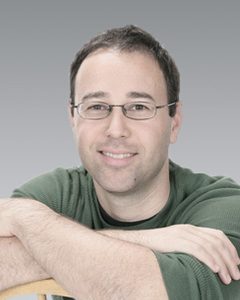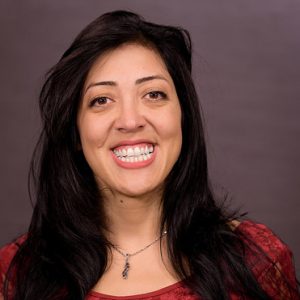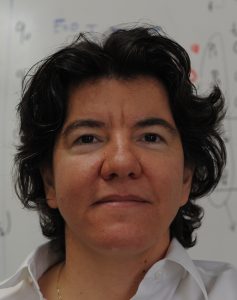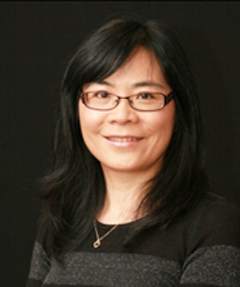Monday, June 3 – 9:00 am
Tsachy Weissman, Stanford University
Title: What machines can learn from humans about compression
Abstract: Inspired by Shannon’s work on estimating the entropy of a language, we experimented with a framework for image compression comprising one human describing images using text instructions to another, who is tasked with reconstructing the original image. These image reconstructions were then rated by human scorers on the Amazon Mechanical Turk platform and compared to reconstructions obtained by existing image compressors. We’ve conducted similar experiments for audio compression. The insights gleaned from these experiments offer a perspective on the potential for substantial improvements over current approaches to lossy compression.
Bio: Tsachy Weissman has been on the faculty of the Electrical Engineering department at Stanford since 2003, where he enjoys activities such as research and teaching the science of information. He has served and still does on editorial boards for scientific journals, technical advisory boards in industry, and as founding director of the Stanford Compression Forum. His favorite gig to date was being an advisor to the HBO show “Silicon Valley” until he was terminated when it was realized his students are more creative and reliable consultants. He hates writing about himself in the third person.
Monday, June 3 – 1:30 pm
Tara Javidi, University of California, San Diego
Title: Active Hypothesis Testing, Information Acquisition, and Active Learning
Abstract: This lecture considers the next generation of data science problems where the data can be collected actively during the training and inference phases. Consider a decision maker who is responsible to actively and dynamically collect data/samples so as to enhance the information about an underlying model or a partially observe phenomena of interest while accounting for the cost of communication, sensing, or data collection. The decision maker must rely on his current information state to constantly (re-)evaluate the trade-off between the precision and the cost of various actions.
The first part of this talk will report on ongoing research on the intersection of active hypothesis testing, information theory, and machine learning. In particular, we characterize an often overlooked inherent trade-off between reliability and information acquisition rate. Furthermore, appropriate variants of posterior matching is shown to significantly reduce the cost of data collection and/or data labeling while ensuring reliability and fidelity during the training or run-time. In the second part of the talk, depending on audience interest, I illustrate our findings and algorithms either in the context of 1) provable adaptivity gains for measurement-dependent noisy search, or 2) DetecDrone: an ML-enabled drone intelligence platform developed in my lab to provide search, mapping, and monitoring on off-the-shelf low cost drones.
Bio: Tara Javidi received her BS in electrical engineering at Sharif University of Technology, Tehran, Iran. She received her MS degrees in electrical engineering (systems) and in applied mathematics (stochastic analysis) from the University of Michigan, Ann Arbor. She received her Ph.D. in electrical engineering and computer science from the University of Michigan, Ann Arbor, in 2002.
From 2002 to 2004, Tara Javidi was an assistant professor at the Electrical Engineering Department, University of Washington, Seattle. In 2005, she joined the University of California, San Diego, where she is currently a professor of electrical and computer engineering. In 2013-2014, she spent her sabbatical at Stanford University as a visiting faculty. At the University of California, San Diego, Tara Javidi is a founding co-director of the Center for Machine-Integrated Computing and Security, is the principal investigator of DetecDrone Project and is a faculty member of the Centers of Information Theory and Applications (ITA), Wireless Communications (CWC), Contextual Robotics Institute (CRI) and Networked Systems (CNS). She is also a founding faculty member of Halicioglu Data Science Institute (HDSI) at UCSD. At UCSD, she is an affiliate faculty member in the departments of Computer Science and Engineering as well as Ethnic Studies. She is also a member of Board of Governors of the IEEE Information Theory Society (2017/18/19).
Tara Javidi’s research interests are in theory of active learning, information acquisition and statistical inference, information theory with feedback, stochastic control theory, and wireless communications and communication networks. She was the guest editor for the IEEE Journal of Selected Areas in Communications special issue on Communications and Control. From 2011 to 2014, she was an associate editor for ACM/IEEE Transactions on Networking and the editor for the IEEE Information Theory Society Newsletter. From 2014-2017, she served as an associate editor for IEEE Transactions on Information Theory. She currently serves as an associate editor for IEEE Transactions on Network Science and Engineering.
Tara Javidi received the 2018 and 2019 Qualcomm Faculty Award for her contributions to wireless technology. Tara Javidi was a recipient of the National Science Foundation early career award (CAREER) in 2004, Barbour Graduate Scholarship, University of Michigan, in 1999, and the Presidential and Ministerial Recognitions for Excellence in the National Entrance Exam, Iran, in 1992. In addition to numerous contributed and invited talks, she was a tutorial speaker at various international and prestigious conferences: International Conference on Cognitive Radio Oriented Wireless Networks (CROWNCOM) 2010, ACM International Symposium on Mobile Ad Hoc Networking and Computing (Mobihoc) 2013, International Symposium on Information Theory (ISIT) 2014, and IEEE Conference on Decision and Control (CDC) 2016. Tara Javidi was a Distinguished Lecturer of the IEEE Information Theory Society (2017/18). She is currently a Distinguished Lecturer of the IEEE Comunnications Society (2019/20).
Tuesday, June 4 – 9:00 am
Lizhong Zheng, Massachusetts Institute of Technology
Title: Universal Features – Information Extraction and Data-Knowledge Integration
Abstract: With the growing demand of using data analytics in a wide range of applications, a key research challenge has emerged to represent data in a generic semantic space, where we need to have a quantitative way to represent the useful information and knowledge succinctly, and at an abstract level. The key issues include how to define a universal interface for knowledge representation, how to manage and integrate the knowledge from multiple data sources, how to utilize domain knowledge, and how to cope with non-ideal situations such as the disparity in the quality of different datasets and precision losses in the processing.
We have numerous algorithms as possible ways to achieve such goals. Particularly, neural networks are expected to play a key role. The main difficulty is that we still do not have a complete theory about deep learning, to identify exactly what knowledge is learned by neural networks, what hidden assumptions are needed for the desirable performance. In this talk, we try to address this problem by developing a theoretical structure to measure the meaning of information by its relevance to specific inference problems, and from that we explain the behavior of neural networks as extracting “universal features”, defined as the solution to a specific optimization problem. This helps us not only to understand the learning process inside a large neural network, but also to draw connections to a number of well-known concepts in statistics and other learning algorithms. Based on this theoretic framework, our goal is to develop more flexible, robust, and interpretable data embedding algorithms.
Bio: Lizhong Zheng received the B.S and M.S. degrees, in 1994 and 1997 respectively, from the Department of Electronic Engineering, Tsinghua University, China, and the Ph.D. degree, in 2002, from the Department of Electrical Engineering and Computer Sciences, University of California, Berkeley. Since 2002, he has been working at MIT, where he is currently a professor of Electrical Engineering. His research interests include information theory, statistical inference, communications, and networks theory. He received Eli Jury award from UC Berkeley in 2002, IEEE Information Theory Society Paper Award in 2003, and NSF CAREER award in 2004, and the AFOSR Young Investigator Award in 2007. He served as an associate editor for IEEE Transactions on Information Theory, and the general co-chair for the IEEE International Symposium on Information Theory in 2012. He is an IEEE fellow.
Tuesday, June 4 – 1:30 pm
Sennur Ulukus, University of Maryland, College Park
Title: Private Information Retrieval Capacity
Abstract: Private information retrieval (PIR) refers to the problem of retrieving a file (a message) out of M messages from N distributed databases in such a way that no individual database can tell which message has been retrieved, hence the name, “private” information retrieval. PIR has originated in the computer science literature in late 1990s and has been revisited by the information theory community recently. Information-theoretic reformulation of the problem defines the “PIR capacity” as the largest number of bits that can be retrieved privately per download, equivalently, the smallest number of downloads needed per bit of privately retrieved information. In this talk, we will describe the problem, summarize break-through results in the history of the problem, and present some recent results. The talk will be self-contained; no prior information is needed, except for basic information theory and coding.
Bio: Sennur Ulukus is the Anthony Ephremides Professor in Information Sciences and Systems in the Department of Electrical and Computer Engineeringat the University of Maryland at College Park, where she also holds a joint appointment with the Institute for Systems Research (ISR). Prior to joining UMD, she was a Senior Technical Staff Member at AT&T Labs-Research. She received her Ph.D. degree in Electrical and Computer Engineering from Wireless Information Network Laboratory (WINLAB), Rutgers University, and B.S. and M.S. degrees in Electrical and Electronics Engineering from Bilkent University. Her research interests are in information theory, wireless communications, machine learning, signal processing and networks, with recent focus on private information retrieval, age of information, distributed coded computation, energy harvesting communications, physical layer security, and wireless energy and information transfer.
Dr. Ulukus is a fellow of the IEEE, and a Distinguished Scholar-Teacher of the University of Maryland. She received the 2003 IEEE Marconi Prize Paper Award in Wireless Communications, the 2019 IEEE Communications Society Best Tutorial Paper Award, an 2005 NSF CAREER Award, the 2010-2011 ISR Outstanding Systems Engineering Faculty Award, and the 2012 ECE George Corcoran Outstanding Teaching Award. She is a Distinguished Lecturer of the IEEE Information Theory Society for 2018-2019. She is on the Editorial Board of the IEEE Transactions on Green Communications and Networking since 2016. She was an Editor for the IEEE Journal on Selected Areas in Communications–Series on Green Communications and Networking (2015-2016), IEEE Transactions on Information Theory (2007-2010), and IEEE Transactions on Communications (2003-2007). She was a Guest Editor for the IEEE Journal on Selected Areas in Communications (2015 and 2008), Journal of Communications and Networks (2012), and IEEE Transactions on Information Theory (2011). She is a TPC co-chair of 2019 ITW, 2017 IEEE ISIT, 2016 IEEE Globecom,2014 IEEE PIMRC, and 2011 IEEE CTW.
Wednesday, June 5 – 9:00 am
Gerhard Kramer, Technical University of Munich
Title: Communication Theory for Key Agreement by Public Discussion
Abstract: Secrecy systems often require a key that is shared only by legitimate parties. The process of generating this key is called secret key agreement. We review communication theory of this topic, and present a few new results. The talk will consider the one-time pad (Shannon, 1949), wiretap channels (Wyner, 1975; Csiszár & Körner, 1978), secret key agreement by public discussion (Mauer, 1993; Ahlswede & Csiszár, 1993), and two-way channel models. Time permitting, we will also review recent results on advantage distillation protocols (Gohari, Günlü & Kramer, 2018).
Bio: Gerhard Kramer is Alexander von Humboldt Professor and Chair of Communications Engineering at the Technical University of Munich (TUM). He received the B.Sc. and M.Sc. degrees in electrical engineering from the University of Manitoba, Canada, in 1991 and 1992, respectively, and the Dr. sc. techn. degree from the ETH Zurich, Switzerland, in 1998. From 1998 to 2000, he was with Endora Tech AG in Basel, Switzerland, and from 2000 to 2008 he was with the Math Center at Bell Labs in Murray Hill, NJ. He joined the University of Southern California (USC), Los Angeles, CA, as a Professor of Electrical Engineering in 2009. He joined TUM in 2010. Gerhard Kramer’s research interests are primarily in information theory and communications theory, with applications to wireless, copper, and optical fiber networks.
Gerhard Kramer is an IEEE Fellow since 2010. He has been particularly active in the IEEE Information Theory Society, including co-founding its schools program in 2008 and serving as its president in 2013. He was general co-chair of the 2017 IEEE International Symposium on Information Theory (ISIT) in Aachen, and TPC co-chair of ISIT 2008 and ISIT 2014 in Toronto and Honolulu, respectively. He served as Associate Editor for Shannon Theory for the IEEE Transactions on Information Theory from 2006-2008. He was an IEEE Information Theory Society Distinguished Lecturer from 2015-2016.
Gerhard Kramer was elected to the Bavarian Academy of Sciences and Humanities (Bayerische Akademie der Wissenschaften or BAdW) in 2015. He is a member of the BAdW Technology Forum, and of the selection committee of the BAdW Young Academy. Since 2013, Gerhard Kramer serves as a member of the Board of Curators of the Eduard Rhein Foundation, an independent, non-profit foundation whose exclusive interest is to present monetary awards to individuals for achievements promoting the public welfare. Since 2016, he also serves as a mentor and selection committee member for the Max Weber Program for highly talented students enrolled at universities in Bavaria.
Keynote Speaker
Tuesday, June 4 – 2:45 pm
Peiying Zhu, Huawei
Title: 5G Today and Tomorrow
Abstract: 5G has progressed rapidly from the concept, standard to commercial reality. In this talk, the present will first provide an overview of 5G NR standard progress and use cases from NR R15 and R16, then discuss NR evolution path. In addition, the present will address some key challenges and latest progresses of 5G deployment.
Bio: Dr. Peiying Zhu is an Huawei Fellow and IEEE Fellow. She is currently leading 5G wireless system research in Huawei. The focus of her research is advanced wireless access technologies with more than 200 granted patents. She has been regularly giving talks and panel discussions on 5G vision and enabling technologies. She served as the guest editor for IEEE Signal processing magazine special issue on the 5G revolution and IEEE JSAC on Deployment Issues and Performance Challenges for 5G. She co-chaired various 5G workshops in IEEE GLOBECOM. She is actively involved in 3GPP and IEEE 802 standards development. She is currently a WiFi Alliance Board member.
Prior to joining Huawei in 2009, Peiying was a Nortel Fellow and Director of Advanced Wireless Access Technology in the Nortel Wireless Technology Lab. She led the team and pioneered research and prototyping on MIMO-OFDM and Multi-hop relay. Many of these technologies developed by the team have been adopted into LTE standards and 4G products.





